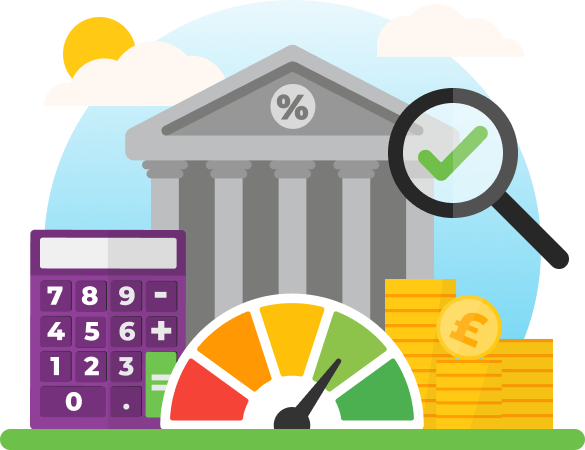There are various reasons why some people consider remortgaging, whether your mortgage deal is up soon or you want to take advantage of interest rates.
If you are planning on remortgaging, Compare My Move can connect you with up to 6 conveyancers to assist with the legal aspects of your remortgage.
In this article, we’ll guide you through key considerations when deciding if remortgaging is right for you.

Compare Mortgage Brokers
Accredited mortgage brokers
Used by over 1.5 million movers in the UK
When is the Best Time to Remortgage?
The right time to remortgage depends on your circumstances, including when your current deal ends and any associated fees. Most people begin their remortgage search between 3 and 6 months before the end of their contract. This is to avoid any penalty costs.
A remortgage solicitor can assist with the legal paperwork and ensure the transfer process is handled correctly.
Technically, you can remortgage at any point. Remortgaging at the right time for your situation may help you access different deals or avoid additional fees.. Here are some factors to consider when deciding if it is the best time to remortgage:
- Current deal is ending: if you decide to remortgage six months before your current deal ends, it may not incur a penalty cost. However, this is dependent on your existing lender, so check their terms and conditions beforehand.
- Better deal: you may feel that you can get a better mortgage deal when remortgaging. This is usually the case for those who have built up equity in their property. It allows them to receive a good deal from either their current lender or a new lender.
- Lower interest rates: remortgaging your property may come with lower interest rates.
Why Should I Remortgage?
Current Deal Is Ending Soon
The most common reason why people seek to remortgage their property is that their current mortgage deal is ending soon. Most mortgage deals are temporary and last for a few years and consist of fixed rate, discount, or tracker mortgages. The type of mortgage you choose will impact how much you pay per month and how much you pay. For example, buy-to-let mortgages can differ from residential mortgages.
If you allow your fixed term to end without arranging a remortgage, you may be charged your current lender’s standard variable rate, known as the SVR. Your SVR may be higher than your previous interest rate.
Looking for a Better Rate
Some people look to remortgage in the hopes of receiving a better rate. If you are currently locked in a fixed-term mortgage contract, you may have to pay an exit fee.
More Flexibility With Mortgage Payments
Another advantage is that remortgaging gives you flexibility with your mortgage payments. For example, if you want to take a mortgage holiday, remortgaging may allow you to do this. This is because you can remortgage to a different loan type that suits your financial situation better.
House Value Has Gone Up
If your house value has gone up, remortgaging may provide you with lower rates. Again, this is not guaranteed and is dependent on your current mortgage deal and financial situation. Some homeowners choose to explore what deals may be available when their property value increases. A mortgage valuation can help to determine this.
Want to Borrow More
Remortgaging your property may allow you to borrow more money. If you wish to make home improvements or pay off other debts, some lenders may offer further borrowing options, depending on your eligibility and application. However, they may ask you for evidence to show that the extra money has gone on what you have declared. Therefore, make sure you keep all communication and documentation to hand.
You're worried about interest rates going up
Variable mortgage repayments vary each month as they are impacted by interest rates. This means that when the Bank of England's interest rates go down, your mortgage repayments will be lower. When the interest rates increase, the repayments will be higher. If you have a fixed-rate mortgage, this means that the interest rates will not affect your repayments during your fixed term.

Compare Mortgage Brokers
Accredited mortgage brokers
Used by over 1.5 million movers in the UK
Why Shouldn’t I Remortgage?
Early Repayment Charges (ERC)
One of the major disadvantages of remortgaging is the early repayment charge (ERC). This is a penalty fee that is paid when exiting a fixed-term mortgage scheme early. Some people may wait until they have between 3 to 6 months left of their fixed term to search for a new deal to avoid paying the ERC.
The ERC amount is dependent on your lender and what you are transferring to. For example, if you are swapping lenders, it is likely that you may be paying a higher amount. However, if you are swapping to another type of mortgage loan with your current lender, they may charge you a lower ERC as this is a product transfer.
Negative Equity
Negative equity occurs when your house value has gone down. Negative equity means that you are paying a larger amount compared to the property value. Being in negative equity does not necessarily affect your credit score, it can lead to problems in the future as it will appear on your credit report.
Some people wait until house prices go up in their area before proceeding to remortgage their homes. This is because it will likely provide better rates. However, this is dependent on your situation and what type of mortgage you have, and how much you have paid off among other factors.
Good Existing Interest Rate With Plenty of Time Left
Some people don’t wish to remortgage as their current deal is good and they don’t want to swap. However, if you are on a fixed-term contract and it is ending soon, your lender may not be offering the same deals. This is because interest rates change and therefore, the mortgage offers will be reflective of this.
Financial Circumstances Have Changed
Your financial circumstances may have changed since taking out your current mortgage deal. This can include losing your job or becoming self-employed. If your financial situation has changed, mortgage lenders may need to see evidence of this. This is because you may not be suitable for certain schemes depending on the lender and the schemes available. If you do not fit the lender's criteria, this can stop you from getting a mortgage.
If you are unable to swap to another lender, your current lender may have other mortgage schemes.
Your mortgage debt is really small
If your mortgage debt is small, such as £50,000 or lower, swapping to another lender may not be worth it. Some lenders may be less likely to offer new deals on lower-value mortgages..
Another important factor to bear in mind is the fees. Smaller mortgages tend to bring larger fees, especially when it comes to swapping lenders. Therefore, make sure you account for this before confirming any changes.
You've had credit problems since taking out your last mortgage
Lastly, you may have had credit issues since taking out your previous mortgage. Qualified mortgage brokers, regulated by the FCA, will assess your application and help identify mortgage options based on affordability criteria.

Compare Mortgage Brokers
Accredited mortgage brokers
Used by over 1.5 million movers in the UK
How Early Can I Remortgage in a Fixed Term?
How early you can remortgage your property in a fixed term is dependent on your lender. However, a mortgage offer lasts for an average of 3 to 6 months. For more information, read our guide on how long does a mortgage offer last.
If you are moving your mortgage, there may be some fees that you have to pay. Fixed-term mortgages mean that you are bound to that lender for a set period of time and will pay a fixed rate. However, if you decide that you want to remortgage before your fixed term has ended, you may have to pay penalties and fees. Checking your lender’s fee structure in advance can help avoid any unexpected costs.
You may have to pay an early repayment charge as well as an exit fee. It’s a good idea to review your broker’s terms and any fees before proceeding.
Is it Better to Remortgage With My Lender or a New Lender?
There are pros and cons to consider when deciding whether you wish to remortgage with your existing lender or a new lender. Some new lenders may offer lower rates, depending on market conditions and your eligibility.. However, the application process takes longer and you will need to take time to compare interest rates.
On the other hand, applying for a remortgage with your existing lender may be easier and more straightforward. However, the downside to remortgaging with your current lender is that the interest rates might not be lower.
Therefore, when it comes to deciding who to remortgage with, research the market thoroughly. Look at what other lenders and providers are offering as well as what your current lender is offering.

